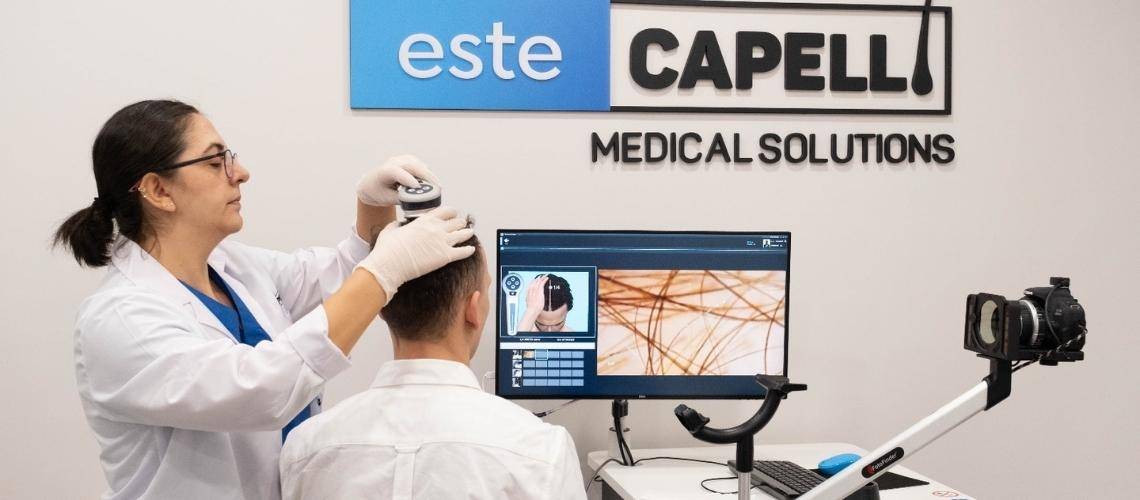
- Hair Transplant
-
by Mehmet Hanifi Kurtlar
The medical field in Turkey has made remarkable strides in the realm of hair transplant procedures, especially for HIV+ individuals. In the past, there were significant reservations and challenges associated with offering hair transplants to those with HIV. Nowadays, advancements in medical technology and practices in Turkey have opened doors to safe and efficacious hair transplant options for these patients.
Estecapelli has been at the forefront of inclusivity and accessibility for patients from different backgrounds and health conditions. Our medical teams have been welcoming HIV Undetectable (under treatment) for the last few years and plan to expand the number of treatments available to patients with transmissible conditions.
Can HIV positive individuals get a hair transplant operation in Istanbul, Turkey?
Yes, absolutely, however there are some conditions. The most important requirement for HIV positive individuals, besides being of good health, is for them to be HIV undetectable – testing negative in crash kit tests — which is achieved through daily viral treatment as prescribed by their physician to reduce their viral load. This not only reduces the impact that the HIV virus causes to a person’s immune system over the long-term, but it also significantly decreases the possibility of transmission and contagion especially while the medical operation is being performed.
As Estecapelli, we are proud to be one of the very few clinics in Istanbul to be welcoming HIV undetectable individuals who wish to get a hair transplant procedure. The goal of a hair transplant is to restore coverage to areas with little to no hair. With improvements in the available techniques and protocols, a hair transplant procedure has become one of the most popular cosmetic surgeries preferred by both men and increasingly women all around the world.
In the last decade, Turkey and in particular Istanbul has stood out as the best destination to get a hair transplant due to its experienced medical staff and affordability. With its headquarters based in Istanbul, Turkey, Estecapelli’s experienced hair transplantation team has been performing hair transplant procedures for many years, including for HIV positive individuals. The procedure is carried out with great care and attention, making sure that all the hygiene protocols are met and the patient’s wellbeing is maximized. At Estecapelli we practise a high degree of discretion by taking steps to protect patient privacy and ensure that our extensive family of patients receive the long-term aftercare that they need to achieve the best possible result from their procedure.
What Should Be Considered before Hair Transplantation for HIV-Positive Patients?
Conscious patients who know that they are HIV positive and have shaped their lives accordingly make up the largest share of people who inquire about getting a hair transplant procedure. HIV positive individuals are often aware of how to protect themselves and others.
Although rare, there may be patients who do not know that they are HIV positive. They might learn about their situation when tests are performed before hair transplantation. In these cases, it may be necessary to postpone the operation. When the patient is HIV positive, 3 main issues have to be considered:
- Since the immune system of the individual may be compromised, a suitable preparation period may be needed in case of any surgical operation. The patient’s immune system should be checked. In case of a risk, the operation should be postponed.
- HIV is transmitted through blood. Surgical operations such as hair transplantation should be performed under high hygiene conditions and with optimum precaution.
- During and after the operation, the patient should be protected against possible inflammatory conditions at the maximum level.
We can list the precautions that should be considered in hair transplantation for HIV positive patients as below:
- Pay close attention to your hygiene before and after the operation.
- Avoid things that will lower your immune system before the operation.
- If you feel any discomfort before the operation, make sure to share it with your doctor.
- Before the operation, you can isolate yourself in case you get any other viral diseases.
- Isolating yourself during the wound healing period can be a precautionary option for the post-operation period.
- Avoid anything that may negatively impact your immune system, such as consuming alcohol and smoking.
- Try to schedule and maintain your sleep patterns.
- Request information from the medical team about how to maximize hygiene especially during after-care period.
Understanding Hair Transplant for HIV+ Individuals
Understanding the nuances of hair transplant procedures for HIV+ individuals requires a deep dive into the medical intricacies and advancements that have made it feasible. Initially, the medical community approached the idea of performing hair transplants on HIV+ patients with significant trepidation. This stemmed from concerns about complications related to the patient’s compromised immune system. However, these procedures have become safer and more effective with medical advancements. Now, specialized techniques ensure minimal risk and maximize the success rate of the transplants.
Key factors contributing to the success of HIV+ hair transplants include:
- Rigorous pre-operative health assessments to gauge the patient’s overall health and immune system status.
- Customized treatment plans tailored to individual health needs.
- Enhanced post-operative care to mitigate any potential complications.
These measures have collectively transformed HIV+ hair transplants from a mere possibility into a successful reality. This progress not only enhances the physical appearance of individuals but also boosts their self-esteem and quality of life.
Hair Loss in HIV-1 Patients
A clinical study by Smith et al. in 1996 highlights hair loss as a prevalent symptom in individuals with HIV-1. This study, involving ten patients diagnosed with HIV, revealed that each of them experienced telogen effluvium, a primary cause of hair loss. Telogen effluvium typically presents as a temporary condition. However, according to research by Rebora in 2016, hair loss persisting beyond six months could indicate a chronic issue. These findings underscore the importance of monitoring hair loss in HIV-1 patients as it can be both a symptom and a marker of the disease’s progression.
The procedure of HIV+ Hair Transplant
The procedure for an HIV+ hair transplant mirrors that of a standard transplant, yet it incorporates specific protocols to ensure utmost safety and efficacy. Initially, the patient undergoes a thorough medical assessment. This step is crucial to determine their eligibility and plan the procedure, considering their unique health status. Following this, the transplant process begins, typically employing techniques like Follicular Unit Extraction (FUE) or Direct Hair Implantation (DHI). These methods are renowned for their precision and minimal invasiveness.
- FUE involves extracting individual hair follicles from a donor area, usually the back of the scalp.
- DHI, on the other hand, allows direct implantation of hair follicles into the balding areas.
Throughout the procedure, maintaining a sterile environment is paramount. Special care is taken to prevent infections, a key concern for HIV+ individuals. Post-operative care then focuses on supporting the patient’s recovery and ensuring the best possible outcome of the transplant. This comprehensive approach facilitates a successful hair restoration process tailored to the needs of HIV+ patients.
Choosing the Right Clinic and Medical Team
Choosing the right clinic and medical team is a critical step for anyone considering an HIV+ hair transplant. The clinic’s experience with HIV+ patients is paramount. A seasoned team ensures not only the success of the procedure but also the patient’s safety. Furthermore, seeking clinics that adhere to strict hygienic standards is essential. This minimizes the risk of infections, a crucial consideration for HIV+ individuals. Additionally, the clinic should have a transparent policy regarding post-operative care. This includes detailed guidelines for recovery and managing potential complications, ensuring a smooth and safe journey towards hair restoration.

